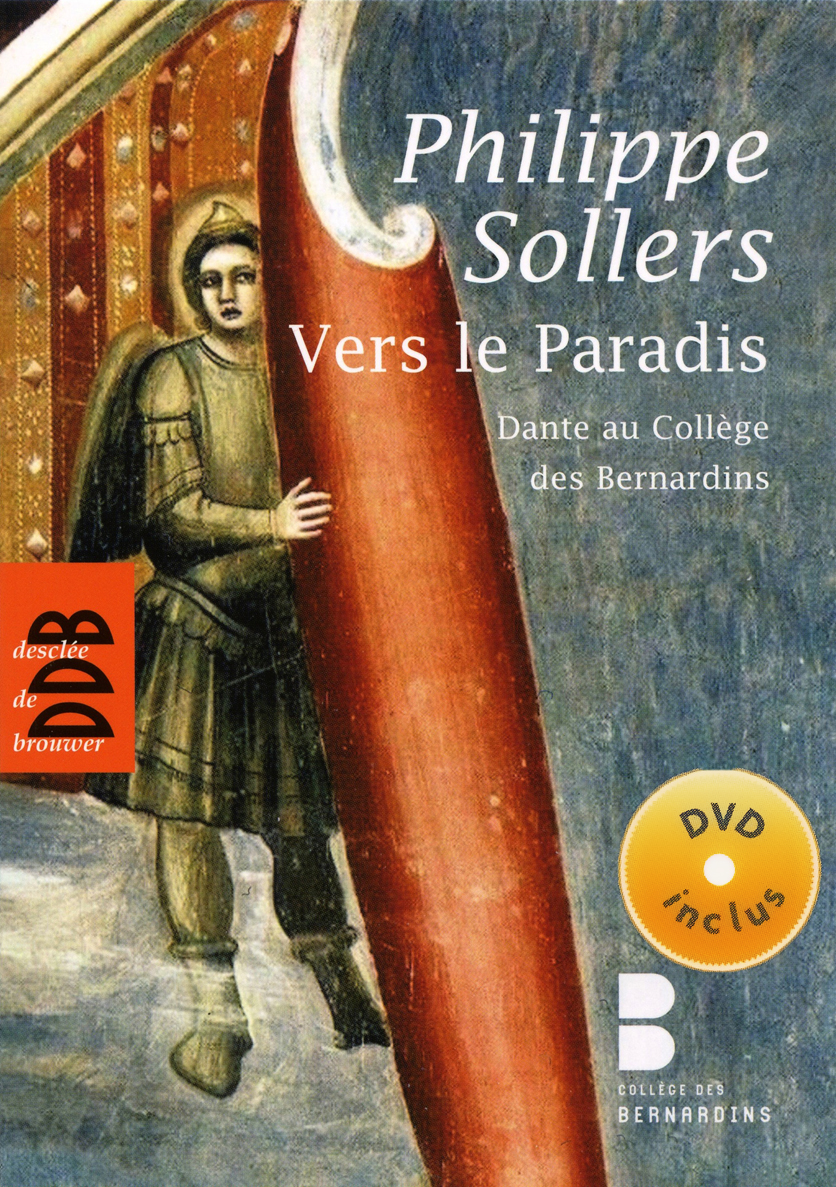 Philippe Sollers
Philippe SollersVers le Paradis (Towards Paradise)
Dante au College des Bernardins
Editions Desclée de Brouwer, 2010
For several decades Dante's work The Divine Comedy has converged with and inhabited that of Philippe Sollers. The writer himself admits: "this book has accompanied me for such a long time, because every time I re-read it, something new always happens. Reading, and the life one might lead elsewhere, if they meet, are an important event. The experience is an inner experience, which should reveal the path we are on, from a hell that is only too evident, towards a paradise that nobody wants to know."
Through the encounter with Dante, we also encounter a whole reflection on our relation to time, to the world, the strain towards Paradise which unfolds. And also a fine way to measure the richness of Catholicism in relation to art, its expression of beauty, from Giotto to Monteverdi, from Michelangelo to Bernini.
Arising from a lecture given by Philippe Sollers at the Bernardine College in Paris, this book is enriched by the film Vers le Paradis (Towards Paradise) by Georgi Galabov and Sophie Zhang.
 "Roman time is always the same... time has stopped, or rather has exploded; bursting, cascading, fluid and fixed like the Glory of the Holy Spirit by Bernini at the end of St Peter's, white dove of the encircled void, melting over us forever amidst the gold; that's the novel. The endless and ever new and ever the same and once again ever varied with regard to the same, with its hands, its characters, and its faces, and its bearings pointing at every digit at once, the clocks chiming every hour at once, with all their might, right among the dates, urbi et orbi. Time has never been lost nor regained, it never was, it never was what it is, at every moment, beyond the dials, the watches, despite the stars, through the stars and the disasters, Candor Illaesus, whiteness intact, engraved, designed, sculpted, painted, swept forth, sung."
"Roman time is always the same... time has stopped, or rather has exploded; bursting, cascading, fluid and fixed like the Glory of the Holy Spirit by Bernini at the end of St Peter's, white dove of the encircled void, melting over us forever amidst the gold; that's the novel. The endless and ever new and ever the same and once again ever varied with regard to the same, with its hands, its characters, and its faces, and its bearings pointing at every digit at once, the clocks chiming every hour at once, with all their might, right among the dates, urbi et orbi. Time has never been lost nor regained, it never was, it never was what it is, at every moment, beyond the dials, the watches, despite the stars, through the stars and the disasters, Candor Illaesus, whiteness intact, engraved, designed, sculpted, painted, swept forth, sung."
"I would like to tell you what we will see in Georgi Galabov and Sophie Zhang's film, and which tries to catch the tone. Just as Dante calls his poem a sacred poem, which isn't a 'poem-poem' but truly has a sacred function, so to speak, so it seemed to me, with my friends, that we could attempt a sacred 18 minute film. It is not a documentary, nor a promotion, of the kind that circulate everywhere; it is about thinking each scene as a function of the words or the music, in such a way as to make heard, towards Dante, what could be a space which would be completely changed, or spaces, starting from a time regained. And so, we enter into a different relation between words, music, in other words seeing and hearing, with scenes in Venice, in Rome or in Paris. Thus, you will enter the church of St Thomas Aquinas in Paris with Bach, it's quite unexpected. Let me make it clear that for me there are in fact evangelists in music, like Monteverdi, Haydn, Bach and Mozart, who stand there, quite at home. There are also evengelists named Giotto, Titian, Michelangelo and Bernini, who are there, at home. It's about making you aware, in an intense way, that we aren't filming for nothing, that we aren't speaking for nothing, and that speaking implies a kind of fundamental enjoyment; speaking, because Dante says it a lot, it follows from what he says, that he sees, that he enters more and more into the heart of an extravagant enjoyment. We will shortly return to Cantos XXXII and XXXIII. For the moment, let's take note of this remarkable poem by Georgi Galabov and Sophie Zhang. Do not be surprised to hear, when the dome of St Peter's appears, a bit of Chinese music, because I asked them if they agreed - the term 時 (shi), time, appears, moreover, at the heart of the operation - that we dedicate this film, this DVD, which might circulate, clandestinely I hope, in China, that we dedicate it with determination to the clandestine Chinese Catholic Church, the one which has remained faithful to Rome, thus to the Pope, and which is, day and night, suppressed and persecuted."
- Philippe Sollers (Translations: A Curran)
"Nothing is more misunderstood, today above all, than Dante's Paradise, that is to say a supremely Catholic message of knowledge, of love, of wonder and of joy" - Philippe Sollers
Original lecture given by Philippe Sollers at the Bernardine College with Fr. Antoine Guggenheim
Dante's Catholicism (in French)
Running time: 01:18:40
Also at the Bernardine College, as part of a symposium organised by La Revue des Deux Mondes entitled 'Catholicism: Grandeur and Misery', Philippe Sollers gave the following lecture which one might call, in his own words: ''Grandeur of the Catholic Church, Misery of the World"
On the Vatican website, virtual tour of the Basilica of St Peter (with Bernini's Glory at the end of the apse)


No comments:
Post a Comment